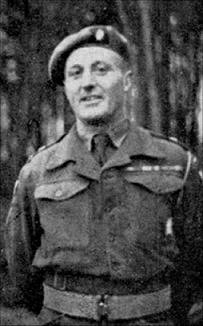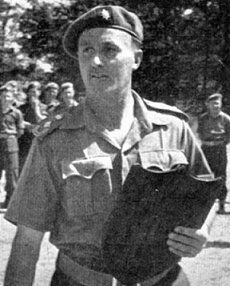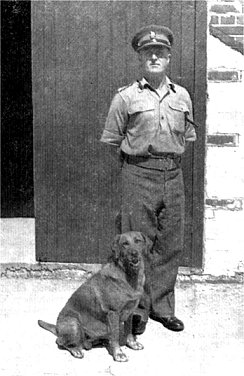Colonel Robert Edgar Lavington TUCKEY (17624)
Commanded the 1st Battalion Worcestershire Regiment from July 1946 to January 1949.
Robert Edgar Lavington Tuckey was born on 14th March 1902 at Coleford, Gloustershire. Son of Robert Leonard Tuckey (Bank Manager) and Marion Tuckey (née Lavington). He was educated at boarding school at Malvern, Worcestershire. He was commissioned into The Worcestershire Regiment from R.M.C. Sandhurst on the 14th July 1921. He joined the 1st Battalion in Nazirabad Rajputane in 1921 and served with them in India until 1929. While in India he attended an M.G. course at Ahmendnager, obtaining a Distinguished qualification. He was at the Depot Norton Barracks 1929-31. After a tour of duty with the 1st Battalion Worcestershire Regiment in Plymouth 1932-34, he was posted to the Small Arms School, Netheravon, and served there as an instructor from 1935-36. He became Adjutant 1st Battalion Worcestershire Regiment, in Aldershot in 1936 and served with them at The Tower of London and went out to Palestine with them in 1938 during the particularly difficult period of the Arab Rebellion. Promoted Major in 1938, he was mentioned in despatches in 1939. At the end of the year he moved with the Battalion to the Sudan. In 1940 he attended the Staff College at Haifa, and afterwards became D.A.Q.M.G. Sudan for Wingate's 101 Mission to Abyssinia. He was second-in-command of the 1st Battalion Worcestershire Regiment in the Western Desert in July 1941 and then from September—November 1941 was B.M. H.Q. 29 Infantry Brigade. After this he returned to the 1st Battalion as 2 i/c to Lieut.-Col. J. O. Knight and was present at Point 187 and Tobruk. |
Lieut.-Col. R. E. L. Tuckey |
He was mentioned three times in despatches in December 1941, June and December 1942. He was a prisoner of War in Italy 1942-43 and on the collapse of Italy escaped but was recaptured. He was a prisoner of War in Germany from March 1944 to April 1945 and he escaped again as the Germans marched the P.O.W. from their camp; he later joined the advancing Americans.
Lieut.-Colonel Tuckey |
On returning to England in 1945 he served on the Staff of H.Q. East and West Riding District at Leeds for a year as a Lieut.-Colonel. He took over command of 1st Battalion The Worcestershire Regiment in May 1946 from Lieut.-Colonel C. P. G. Wills. During his tour of command the Battalion served at Gandersheim, Trieste, Pola, Luneburg and Berlin. The latter station during the Berlin Air Lift. The 1st Battalion reached a very high standard of efficiency under his command and there are many officers who even now refer back to what the Battalion did under Robin Tuckey. It was under him, that the standard of shooting was raised and due to this initial efforts has been to the fore at Bisley ever since. After his most successful tour in command he was promoted Temporary Colonel and was Commandant of the Army M.T. School and Garrison Commander Bordon Hampshire 1949-53. He retired from the Army in 1953 with the Honorary rank of Colonel. He was in the Army Hundred in 1937, 1949 and 1950, being 12th in the Army Hundred in 1949. He shot for the English Regiments VIII in the Methuen Cup in 1949. He was in the Army Revolver XXX at Bisley 1937 and 1948-52. He was a keen sportsman and loved his shooting and fishing. He was never happier than when being out in the country with his rod or with his dog and a gun under his arm. Colonel R. E. L. Tuckey died on Saturday, 6th August 1977. |
Brigadier Donald Nott wrote of him: He was bitterly disappointed that he never had the opportunity of operational command in World War II: and so were all those who knew his qualities and natural gift of Command. But it was as a fellow P.O.W. that I got to know him best. You can't live literally cheek by jowl with somebody for nearly three years without getting to know how he ticks. In spite of the inevitable mental and physical attrition he showed his great strength of character, especially when as Senior British Officer at various camps, he had to deal with and so stoutly stood up to Italian and German Camp Commandants. For him there were no shades of right and wrong; he was uncompromising. He despised pomposity and beaurocracy: he deflated the former and fought tooth and nail the latter. But he was a kind and generous man with a splendid sense of humour who could make a most devasting remark with a very straight face but with a small twinkle in the eye. Alas, in latter months the twinkle appeared less frequently as his health declined. We often shot together, both at home and abroad. It was a pleasure to shoot with such a "Tuke" will be sadly missed by all his friends and he will be remembered for his true and warm friendship and his honest-to-God integrity which more could well emulate in this modern society. A good man and true. Our hearts go out to Isobel and the family." |
Colonel Tuckey with his dog |



